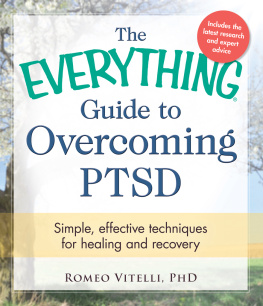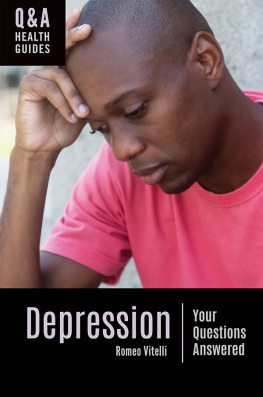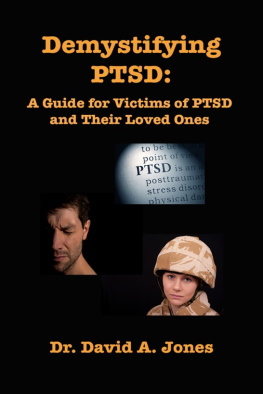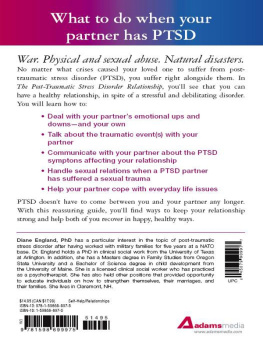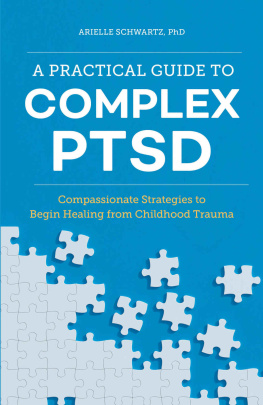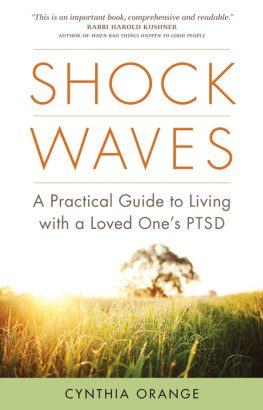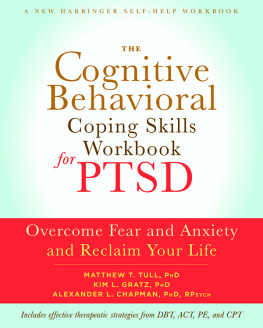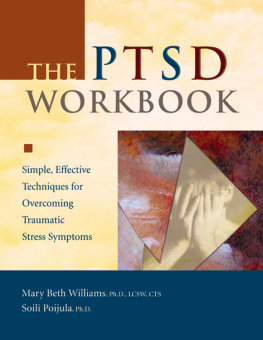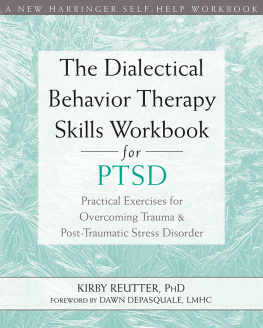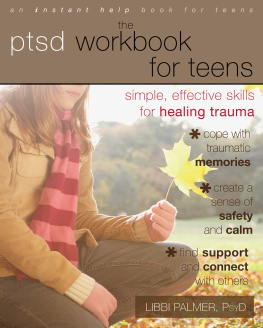THE

GUIDE TO
OVERCOMING PTSD
Simple, effective techniques for healing and recovery
Romeo Vitelli, PhD

Avon, Massachusetts
Contents
Top 10 Ways to Cope with PTSD
- Learn all you can about the different symptoms of PTSD. Understanding what is happening to you can help you better cope with what is happening.
- Identify the different emotional states you are experiencing. Try to understand why you are feeling angry, anxious, or depressed and what is triggering these emotions in you.
- Learn about the different triggers that can lead to flashbacks and unpleasant memories. These can include certain sights, sounds, and even odors that you have learned to associate with traumatic memories.
- Keep track of important anniversary dates. Your symptoms are more likely to flare up at certain times and places that are more likely to remind you of what you experienced.
- Dont be afraid to share your feelings with others. Isolating yourself from the important people in your life means depriving yourself of valuable support.
- Learn about relaxation and stress management techniques that can help you control panic and anxiety attacks. Make certain that you pace yourself to keep stress from building up in your daily life.
- Learn about grounding techniques that can help you root yourself in the present. These are especially important during flashbacks or when the intrusive memories are overwhelming you.
- Learn about sleep hygiene and how to get to sleep at night naturally and without relying on sleep medications.
- Establish realistic life plans for yourself and dont become pessimistic if you arent recovering as quickly as you would like. There is no fixed timetable and everyone is different.
- Maintain strong social support networks. That can include family members, friends, coworkers, therapists, community workers, fellow trauma survivors, and volunteers. Learn to depend on them and to offer help to others as they need it.
Introduction
IF YOU HAPPEN to be a fan of the Beetle Bailey comic strip, you likely noticed something odd that happened to Beetle in early 2013. Running steadily since 1950, the comic strip by Mort Walkerwhich features the misadventures of a rather unmotivated army private and his perennial clashes with his arch-nemesis, Sergeant Snorkelhas usually focused on the funny side of life in the U.S. Armed Forces. In June, though, the three-panel strip featured Beetle in bed having a series of nightmares relating to his experiences in the army. In the third panel, Bailey is wide awake with the message, Post-Traumatic Stress Can Affect Any Soldier.
This installment of the comic strip was run by Mort Walker to help kick off a public service campaign that wanted to call attention to the epidemic of post-traumatic stress among the men and women in the U.S. Armed Forces. Beginning in the month of June, which is Post-Traumatic Stress Disorder (PTSD) Awareness Month, the campaign highlighted the critical need for soldiers with PTSD and traumatic brain injury (TBI) symptoms to come forward and seek treatment.
In recent years, treating PTSD in returning veterans has posed major challenges for mental health professionals. The surge in new cases threatens to overwhelm available health services even though many veterans refuse to seek help. With an estimated 19 percent of the 1.6 million members of the U.S. Armed Services deployed to Iraq and Afghanistan in the past five years reporting mental health symptoms, finding better treatment options has become more crucial than ever.
But PTSD doesnt just affect soldiers. According to a 2009 study by the World Health Organization examining trauma in twenty-one countries, a substantial minority of the people responding to the study reported experiencing a traumatic event, whether through exposure to war, a serious accident, trauma involving a loved one, or through witnessing or becoming a victim of violence. The National Comorbidity Survey estimated that in the United States alone, the lifetime prevalence of PTSD is 6.8 percent. That figure is substantially higher for women (9.7 percent) than men (3.6 percent) reflecting the impact of domestic violence and sexual abuse.
For people dealing with PTSD, the temptation to tough it out and not seek treatment can be hard to resist, especially considering the stigma that is often associated with any form of psychiatric problem. But the symptoms rarely go away on their own, and untreated PTSD can lead to a wide range of problems including substance abuse, depression, medically unexplained physical problems, and even suicide.
The following chapters will explain the definition of PTSD, introduce the most common symptoms linked to the PTSD diagnosis, and discuss the most effective treatment methods that have been developed to date. Please note that this book is not intended as an aid to help you diagnose yourself. If you suspect that you or a loved one is experiencing PTSD symptoms, the Appendix section will provide you with possible resources to get the proper treatment. While seeking help can be a frightening prospect, especially for someone who has never attended counseling before, the resources in this book can assist you in achieving that goal. Just remember that the right help is out there.
CHAPTER 1
The Basics of PTSD
Most everyone has experienced stressful situations in their lives, but sometimes these events can have a lasting impact on a persons mental and physical well-being. According to the fifth edition of the Diagnostic and Statistical Manual of Mental Disorders (DSM-5) released in early 2013, Post-Traumatic Stress Disorder (PTSD) is defined as the development of characteristic symptoms following exposure to one or more traumatic events. The DSM-5 goes on to define a traumatic event as occurring when a person experienced, witnessed, or was confronted with an event or events that involved actual or threatened death or serious injury, or a threat to the physical integrity of self or others. Though most people who experience traumatic events will not develop PTSD, there is no way to predict who will develop symptoms and who will not.
Definition of PTSD
The three major features that characterize PTSD are the re-experiencing of the traumatic event through dream and/or waking thoughts; emotional numbing to other life experiences and relationships; and symptoms of autonomic instability, depression, and cognitive difficulties (such as poor memory or concentration). In people with PTSD, autonomic instability can include physiological signs of high stress including rapid heartbeat, excessive sweating, and high or low blood pressure. Though some degree of acute stress is often found in people experiencing traumatic events, a diagnosis of PTSD typically requires that symptoms last longer than one month and that they are severe enough to interfere with occupational or social functioning.

It is important to draw a clear distinction between words such as traumatic and stressful, which are often treated interchangeably. Though there can be some overlap between how people respond to traumatic events and highly stressful situations, they are not the same thing. Everyone faces everyday hassles and life-changing events such as unemployment, but survivors and families of survivors know that traumatic stress is very different.

